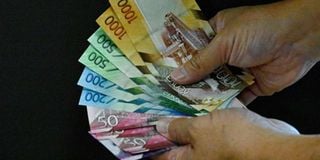It’s time to end foreign aid to Kenya and leave us to fund our corruption

A man holds the new Kenyan currency bank notes.
What you need to know:
- Until last year, global foreign aid flows were rising steadily even as their impact and effectiveness remain questionable.
- The World Bank revealed it had found Sh328 billion stashed in offshore accounts.
There are strong reasons why advanced economies provide financial assistance to their poorer counterparts. It is not charity but an obligation and ‘reparation’ arrangement formalised by a 1971 United Nations General Assembly resolution.
Aid is seen as an attempt by the North at addressing centuries of exploitations by bridging gaps in development finance and national budgets in their former colonial territories.
Until last year, global foreign aid flows were rising steadily even as their impact and effectiveness remain questionable. In its 70 years, it has not propelled a country to higher levels of development. But there still is a constant recalibration of expectations and language.
After advancing “the principles of aid effectiveness”, members of an exclusive club of donors are unilaterally engaged in “aid modernisation”. They now call it “development cooperation”.
VULNERABLE COUNTRIES
A few of them have opted to only fund the most vulnerable countries yet nearly all trumpet the role of development aid as “a catalyst to crowd in public and private resources”. Still, there is no evidence aid works.
Under President Uhuru Kenyatta, the aid budget has held steady. In his first six years, he received $28 billion. In comparison, his predecessor, President Mwai Kibaki, received $30 billion over 10 years.
In per capita terms, aid has risen 55 per cent under President Kenyatta to $53.9, compared to $34.7 under President Kibaki.
Despite this generosity, aid has visibly been of little benefit and Kenya is a textbook example of a country that does not need foreign aid. Critics say aid is a neo-imperialism foreign policy instrument for buying and maintaining patronage and ending poverty and boosting livelihoods is mere rhetoric.
PERPETRATORS ‘SANITISED’
Aid is highly distortionary: It undermines governance and replaces the quest for self-reliance with dependence. It is also fraught with waste and corruption claims that are hardly investigated, neither donors nor recipients try to make it transparent, accountable and effective.
Awash with aid receipts, loan proceeds and tax revenue, corruption under Jubilee has risen to new levels. Perpetrators of fraud are “sanitised” by compromised gatekeepers. Aid support to the national budget indirectly funds the charade in which a third of our national budget is pillaged — with the NCCK putting the figure at Sh700 billion.
The World Bank revealed it had found Sh328 billion stashed in offshore accounts and, weeks later, Jack Ma’s planeload of medical donations were stolen on arrival. This notwithstanding, the bank and other donors have been issuing new loans for Covid-19 and the ‘Big Four Agenda’ (the latter seems like a scam in the making).
Who really gains from this high-stakes corruption and why are our so-called development partners indifferent to it?
A portion of our national budget is expected to be supported by foreign handouts. How is this tolerable, six decades since Independence?
Salaries of state and public officers may be regulated but our political elites, including members of county assemblies and Parliament, receive remunerations comparable to their European counterparts.
CORRUPTION
They are ever seeking opportunities to travel business class overseas and stay in upscale hotels yet the country lacks basic services.
Isn’t this level of corruption, extravagance and waste enough to make Nairobi-based diplomats advise their capitols to redirect their taxpayers’ funds elsewhere?
We want to enlarge the feeding trough for the Executive yet the government no longer esteems its taxpayers. Kenyans are casually killed almost daily for not wearing face masks and homes are being torn down during a pandemic. Investors are harassed with the State seeking penalties that would put them out of business.
We need neither aid nor debt relief. Let donors allow us an opportunity to fund our corrupt government. It’s our civic duty.
Mr Chesoli is a New York-based development economist and global policy expert. [email protected] @kenchesoli





